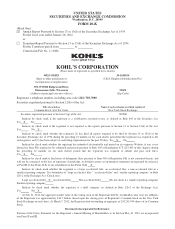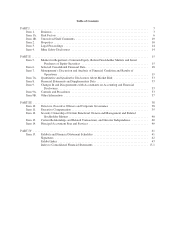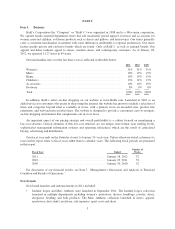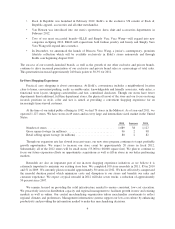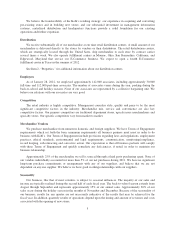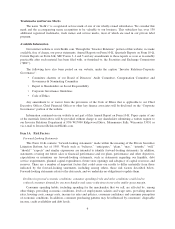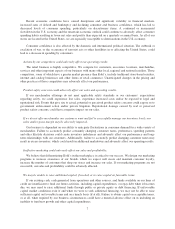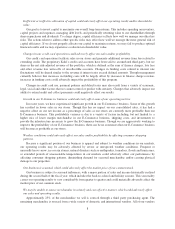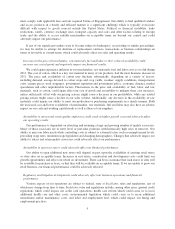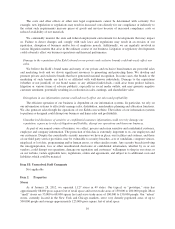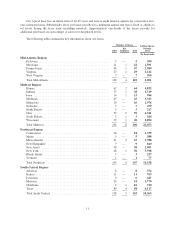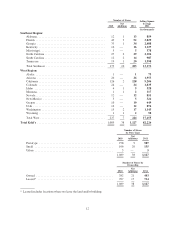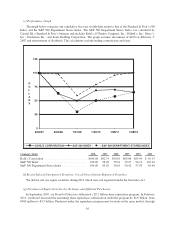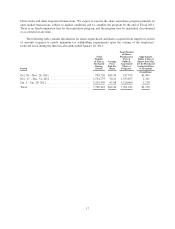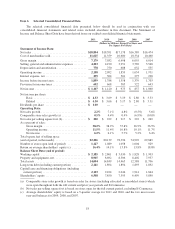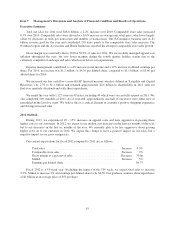Kohl's 2011 Annual Report Download - page 9
Download and view the complete annual report
Please find page 9 of the 2011 Kohl's annual report below. You can navigate through the pages in the report by either clicking on the pages listed below, or by using the keyword search tool below to find specific information within the annual report.must comply with applicable laws and our required Terms of Engagement. Our ability to find qualified vendors
and access products in a timely and efficient manner is a significant challenge which is typically even more
difficult with respect to goods sourced outside the United States. Political or financial instability, trade
restrictions, tariffs, currency exchange rates, transport capacity and costs and other factors relating to foreign
trade, and the ability to access suitable merchandise on acceptable terms are beyond our control and could
adversely impact our performance.
If any of our significant vendors were to become subject to bankruptcy, receivership or similar proceedings,
we may be unable to arrange for alternate or replacement contracts, transactions or business relationships on
terms as favorable as current terms, which could adversely affect our sales and operating results.
Increases in the price of merchandise, raw materials, fuel and labor or their reduced availability could
increase our cost of goods and negatively impact our financial results.
We could again experience inflation in our merchandise, raw materials, fuel and labor costs as we did during
2011. The cost of cotton, which is a key raw material in many of our products, had the most dramatic increase in
2011. The price and availability of cotton may fluctuate substantially, depending on a variety of factors,
including demand, acreage devoted to cotton crops and crop yields, weather, supply conditions, transportation
costs, energy prices, work stoppages, government regulation and government policy, economic climates, market
speculation and other unpredictable factors. Fluctuations in the price and availability of fuel, labor and raw
materials, such as cotton, could again affect our cost of goods and an inability to mitigate these cost increases,
unless sufficiently offset with our pricing actions, might cause a decrease in our profitability; while any related
pricing actions might cause a decline in our sales volume. Additionally, any decrease in the availability of raw
materials could impair our ability to meet our production or purchasing requirements in a timely manner. Both
the increased cost and lower availability of merchandise, raw materials, fuel and labor may also have an adverse
impact on our cash and working capital needs as well as those of our suppliers.
An inability to attract and retain quality employees could result in higher payroll costs and adversely affect
our operating results.
Our performance is dependent on attracting and retaining a large and growing number of quality associates.
Many of those associates are in entry level or part-time positions with historically high rates of turnover. Our
ability to meet our labor needs while controlling costs is subject to external factors such as unemployment levels,
prevailing wage rates, minimum wage legislation and changing demographics. Changes that adversely impact our
ability to attract and retain quality associates could adversely affect our performance.
An inability to open new stores could adversely affect our financial performance.
Our ability to open additional new stores will depend, in part, upon the availability of existing retail stores
or store sites on acceptable terms. Increases in real estate, construction and development costs could limit our
growth opportunities and affect our return on investment. There can be no assurance that such stores or sites will
be available for purchase or lease, or that they will be available on acceptable terms. If we are unable to grow our
retail business, our financial performance could be adversely affected.
Regulatory and litigation developments could adversely affect our business operations and financial
performance.
Various aspects of our operations are subject to federal, state or local laws, rules and regulations, any of
which may change from time to time. Such laws, rules and regulations include, among other areas, general credit
regulations which could impact our credit card operations; health care reform which could cause us to incur
additional health care and other costs; environmental legislation which could cause us to incur additional
remediation and/or maintenance costs; and labor and employment laws which could impact our hiring and
employment practices.
9

